While the final outcome of most wars is generally decided on land, occasionally a sea battle can have a profound impact on history as well. More than one empire’s plans for further expansion has been waylaid by a catastrophic sea battle, and even entire kingdoms have been brought to their knees because of some fiasco at sea. Of course, not all of the most important sea battles are large; the Battle of Jutland, for example, was one of the largest naval battles in history but it had little impact on the course of the First World War, while the small engagement between just two ships, the U.S.S. Monitor and the C.S.S. Virginia during the Civil War forever changed the face of naval warfare, making some battles game-changers in terms of tactics and technology. And so, without further ado, here are my candidates for the most important or game-changing naval battles in history.
10. Battle of the Chesapeake, September 5, 1781
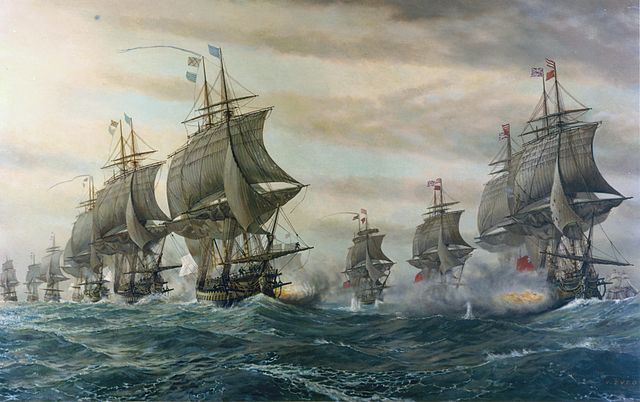
Though a comparatively small battle as far as these things go (24 French ships against 19 British ships), the battle proved important in that it singularly made Washington’s victory at Yorktown in October, 1781 possible. Not really much more than a skirmish that left a handful of ships damaged and about 500 men on both sides dead and wounded, the French fleet successfully forced Admiral Thomas Graves to abandon the bay to the French, thereby leaving General Cornwallis, then holed up in Yorktown, Virginia, on his own. With supplies limited, escape impossible, and a combined American and French Army steadily advancing, Cornwallis
9. Santiago de Cuba, July 3, 1898
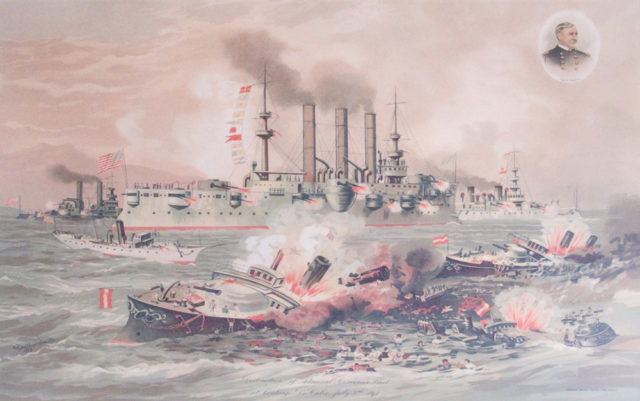
In one of the first clashes between all-metal warships in history, a Spanish fleet of warships was demolished by a similar-sized fleet of American warships off the port of Santiago de Cuba when it tried to escape the port and make a run for the open sea. Led by Spanish admiral Cervera, the decrepit Spanish ships proved to be no match for the American fleet under the joint command of Admirals Schley and Sampson, the result being the loss or capture of all six of ships (four armored cruisers and two destroyers) and the death of 323 men (compared to a single fatality borne by the Americans). So what makes this such an important battle? Like the Battle of Tsushima (we’ll get to that at number 7) the battle had major repercussions on the balance of power in the world. Not only did it force Spain to capitulate, thus bringing an end to the brief Spanish-American War, but it finished Spain as a world power and, with the acquisition of Puerto Rico, Guam, and the Philippines, made America a colonial empire practically overnight.
8. Hampton Roads, Virginia, March 8 & 9, 1862
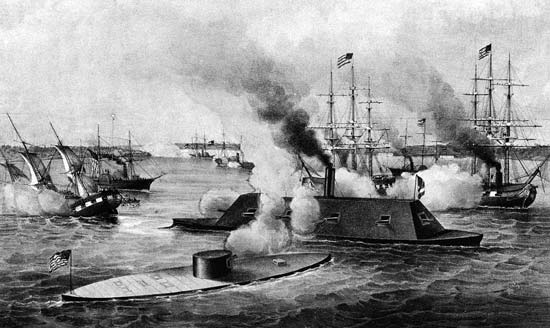
Actually, there were two small battles fought over a twenty-four hour period, both of which involved the same ship and together would change naval warfare forever. The first of these was fought between the Confederate ironclad C.S.S. Virginia (often erroneously referred to as the Merrimac because that was the name of the captured Union vessel upon which the Virginia was constructed) and a fleet of wooden Union warships that was blockading the port of Norfolk, Virginia (then in Confederate hands). This first battle effectively spelled the beginning of the end of wooden-hulled warships when the Virginia quickly sunk the warships Cumberland and Congress and badly damaged a third ship before retiring—which she accomplished largely unscathed thanks to her slopping, ironclad hull design. The next day’s battle, however, was not so successful. Intending on finishing off the remaining blockaders the next morning, the Virginia was surprised to be met by the Union’s own version of an ironclad—the all steel Monitor—and the first battle between all-metal warships in history was underway. Using her revolutionary rotating turret, the Monitor, though she mounted just a pair of cannons to the Confederate warship’s 12 guns, easily matched the Virginia’s rate of fire (which, in being fixed, could only be fired when the ship was pointed directly at the Union ironclad). The result of the three-hour brawl ended in a draw, with neither ship possessing enough firepower to deliver a deathblow, and the combatant’s retired, never to fight again. While historians still argue who actually won the battle, it is generally conceded that in preventing the Virginia from breaking the Union blockage, it was at least a strategic victory for the North, who were able to continue blockading the southern ports throughout the balance of the war. Even more important, however, was that the two vessel’s revolutionary use of iron was to forever transform the nature of naval warfare, which from henceforth would be fought between ships built of iron and driven by steam rather than of wood and sail.
7. Tsushima Straights, 27-28 May, 1905
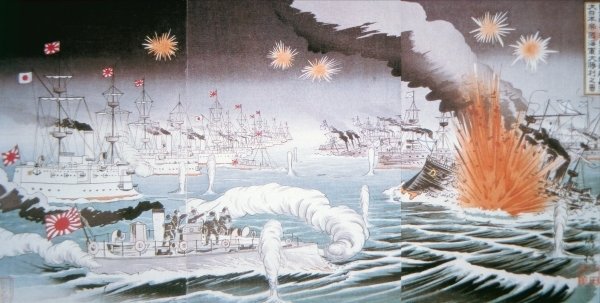
In what could only be declared as one of the most lop-sided victories in naval warfare, a Russian fleet of nearly a dozen battleships and seventeen smaller vessels was decimated by a Japanese fleet off the southern coast of Korea. Under the command of the legendary Admiral Togo, over the course of two days the Japanese managed to sink no fewer than 21 of the 28 ships of the Czar’s once mighty fleet and capture seven more—all without the loss of a single capital ship. The battle was such a humiliating debacle for Imperial Russia that it forced an end to the year-long war between the two countries on terms favorable to Japan and may have heralded the beginning of the end for the Czar’s reign. (Though he was to hold onto power for another twelve years, the loss of prestige energized anti-royalty forces inside Russia, which, combined with the debacle of World War One, ultimately led to his abdication in 1917.) The downside for Japan was it gave the Japanese military such a sense of superiority that it would ultimately encourage the start of its own Asian empire, resulting in a protracted war with China thirty years later and, ultimately, a disastrous war with the United States.
6. Trafalgar, October 21, 1805
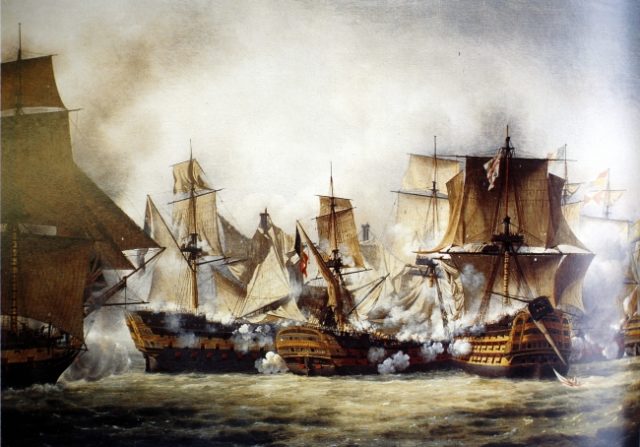
In one of the most famous engagements in British naval history, a British fleet of 33 ships under the legendary Lord Horatio Nelson, took on a larger, combined Spanish and French fleet off the southwest coast of Spain and routed it, capturing half of the Franco-Spanish fleet without losing a single ship of its own. The battle was such a serious setback for Napoleon that he was unable to maintain a serious threat of invading England, ensuring that the balance of the Napoleonic Wars—which would rage for another ten years—would be fought entirely on continental European soil. The battle also immortalized Lord Nelson, who died from wounds received during the battle, making him a legend in England and in the annals of naval history, not only for his personal bravery, but for his daring in taking on a superior force using unconventional tactics and proving victorious.
5. Lepanto, October 7, 1571
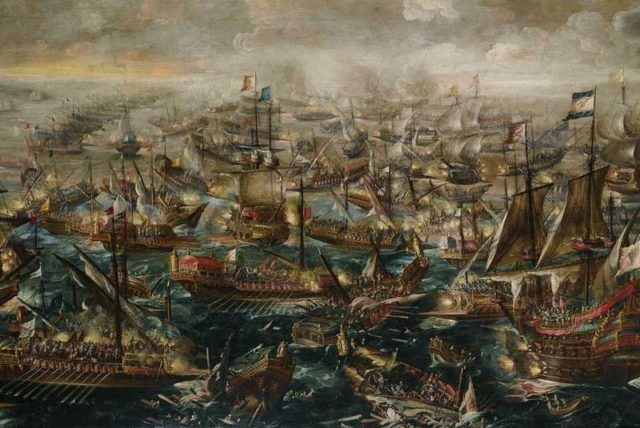
In a battle that was to have major repercussions on Europe for centuries to come, the up-till-then unstoppable Ottoman Navy was positively routed by a coalition of warships sailing under the banner of the Holy Roman Empire near the Greek port city of Corinth. Despite the fact that both fleets were of comparable size, the Holy Coalition somehow managed to sink or capture no fewer than 187 Ottoman ships, kill, wound, or capture over 20,000 Turks, and free some 10,000 Christian slaves that the Turks had been using as oarsmen while losing themselves only 17 vessels. The battle was not just a defeat for the Ottoman Navy, but in being the first loss it had experienced in centuries, it destroyed its air of invincibility and invigorated Europe’s resolve at stopping the Turk’s westward expansion into Europe, preventing Europe from being overrun by the forces of Islam and so potentially saving Christendom. It was also the last major naval battle fought between oar-driven galleys, ending a millennia of naval tactics that revolved around close-order deck-to-deck fighting and ramming.
4. Battle of Midway, June 4-6, 1942
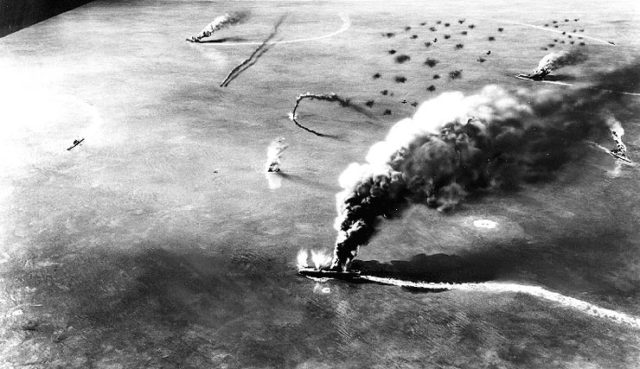
This was the engagement that won the war in the Pacific for the United States by so decisively defeating the Japanese Navy that it was forced to go on the defensive and end its plans for further territorial conquest. (Had it gone the other way, it could well have set the American war effort back a year and possibly even forced the Roosevelt administration to sue for peace.) The interesting thing about this battle is that even though it involved scores of ships on both sides, neither fleet ever spotted the other. In fact, all the fighting was done from the air, with the American and Japanese carrier pilots taking turns trying to send each other to the bottom. In the end, it was Japan who came off the worst: not only did it fail to conquer the strategic island of Midway, but in a fifteen-minute span of time, it lost three of its four big aircraft carriers along with most of its best pilots, ending its dreams of finally defeating the American fleet once and for all. This was also one of the few battles of World War Two in which the Americans were outnumbered, with Admiral Nimitz commanding a fleet built around just three carriers to Japan’s four. The sinking of four of Japan’s irreplaceable carriers was also a sort of payback for Pearl Harbor as all four carriers Japan lost had participated in the attack on December 7th, making it doubly satisfying for a nation still reeling from the disaster of losing the Philippines two months earlier.
3. Battle of the Atlantic, 1939-1945
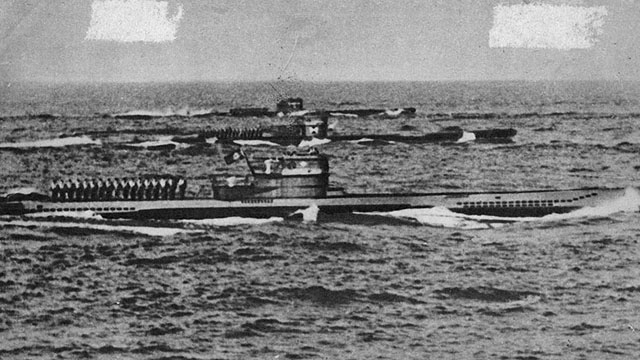
When war broke out in Europe in September of 1939, Germany’s surface navy was no match for the immense Royal Navy so Hitler decided to utilize the same tactic Germany had used that came perilously close to winning the First World War: blockading Britain with its fleet of U-boats. Knowing that denying the British the imports it needed to keep its economy afloat would bring it to its knees, the strategy at first appeared to be working as German U-boats sank British merchant ships faster than they could be built. Once America entered the fray, however, and could bring her immense industrial strength to bear, things began to go sour for the Germans. Despite sinking huge numbers of American ships, by 1943 American industrial capability, combined with improved anti-submarine weapons and tactics, began to take their toll on the German navy until by 1944, U-boat losses were so bad that Germany was no longer able to take the fight to the Allies, thereby assuring ultimate victory in Europe. Before Hitler’s U-boats were finally tamed, however, they had sunk over 3,000 ships and 14 million tons of shipping—accounting for fully 70% of all Allied sea losses of the war. The cost for the German’s had been catastrophic, however, with the loss of nearly 800 submarines and 28,000 men—fully 75% of all the submarine sailors in the entire navy! Had it worked, however, Germany might have won the entire war by starving England into submission, much as American submarines successfully did to Japan by sending her merchant fleet to the bottom, which cut off the import of oil and raw materials Japanese heavy industry so desperately needed to keep fighting.
2. Actium, September 2, 31 BC
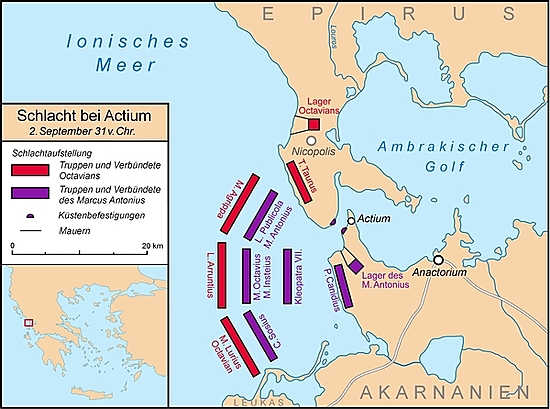
In an epic battle worthy of Hollywood (and redone for the silver screen more than once) the combined fleets of star-crossed lovers Mark Antony and Cleopatra had their proverbial heads handed to them when they met a Roman fleet of nearly 300 galleys near the city of Actium, Greece and were routed. The battle was not only to determine who would rule Rome, but set the course of history for the next six centuries, making it one of the most important fleet actions in history. Alas, as everyone knows, Antony and Cleopatra’s fleet was routed, leaving them without a country and making them fugitives. Not ones to go down with the ship, however, they escaped to safety (abandoning their own fleet in the process), a move which convinced the bulk of Antony’s remaining army to desert and ended in him ultimately committing suicide alongside Cleopatra. The victory also solidified the Roman ruler Octavian’s hold on power and ultimately resulted in him becoming the first Emperor of Rome, effectively ending the Roman Republic and establishing the Roman Empire in its place.
1. Salamis, September, 480 BC
In a battle that seems almost more mythological and real, a fleet of Greek warships under the venerable Greek commander Eurybiades, took on a Persian fleet at least twice its size (and some ancient sources claim three times as large) in the narrow straights between the Greek mainland and the island of Salamis and beat it soundly. Losing as much as half its fleet (according to some accounts) the battle so badly devastated the Persians that the Persian king, Xerxes, was forced to give up on his quest to invade Greece. What made the battle the most important one in history was that in forcing the Persians to give up their quest of invading Greece, the battle potentially saved Greek culture and, by extension, western civilization in the process.
Other important sea battles: Battle of the Downs, 1639 (victory over the British made Holland a major sea power—at least for a time); Spanish Armada, 1588 (a series of small engagements combined with one heck of a storm saved England from Spanish invasion); and Battle of the Philippines Sea, 1945 (finished off the last of the Japanese Navy in one of the largest surface and air engagements in history).
_____________________________________________________________________________________
Jeff Danelek is a Denver, Colorado author who writes on many subjects having to do with history, politics, the paranormal, spirituality and religion. To see more of his stuff, visit his website at www.ourcuriousworld.com.
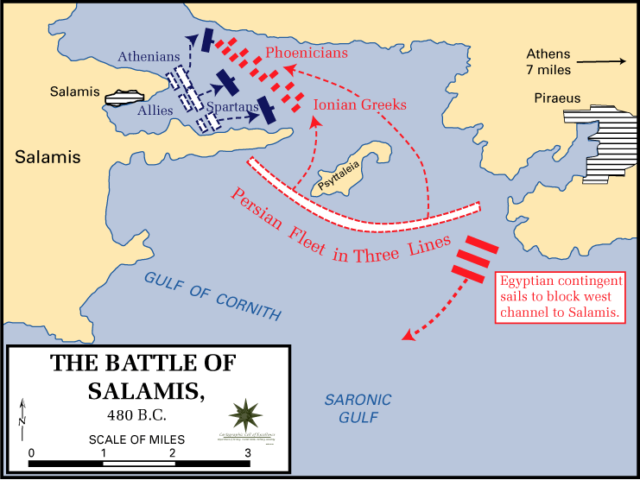
5 Comments
Are you alergy to spaniards ?
What the hell is the Holly Roman Empire ? Who was the comander ? Who was the king who send the vessels ? Where from were the soldiers ?
And when talking about the American Revolution, don´t forget that was the spaniard navy and the spaniar army who defeat and isolate british forces. French helped, but they were not decisive.
The battle of hansando (1592), where the Koreans defeated the Japanese decisively, and doomed Asia into 3 centuries of isolation, is more significant than everything else except maybe Salamis.
If the villain Yi Sun-shin did not do that the entire history of Asia would have been very different – he saved the Western Civilization without ever seeing a white person in his entire life.
As Mr. Universe says, it’s difficult to assess lists like this when we don’t have a clear operational definition of “game-changer” or “decisive.” This list seems especially perplexing because it’s clearly including battles which were “game changers” in quite different ways. Hampton Roads, for example, did not (and could not) alter the outcome of the Civil War in any appreciable way, but it was obviously very influential in changing the technology of naval warfare in an unprecedented way. Whereas Trafalgar and Lepanto did not appreciably change naval technology (indeed, they were last hurrahs of their respective eras), they were obviously quite decisive in altering the outcome of their respective wars.
Some problems with regarding Midway: In the first place, it is simply not true that Japan lost “most of its best pilots.” It lost all aircraft deployed with the Kido Butai, but the majority of pilots were actually recovered and survived – less than a hundred out of under 300 were lost – the real attrition of experienced Japanese naval pilots (it had about 3500 pilots total at the outset of the war, half of which were carrier qualified, roughly) occurred in the battles in the Solomons in 1942-43. More importantly, this helps illustrate why it is hard to consider it really decisive. Certainly it halted Japanese offensive operations, but then IJN logistics were already near their limit anyway; and in any case, Japan had no chance of winning the Pacific War, given the overwhelming US advantages in industrial power, resources and superior war making technology and management. Indeed, the Pacific War was really lost on Dec. 7, 1941. All Midway (spectacular as it was) could do was to delay or accelerate the inevitable result by a few months.
Plus, I have to question what you mean by game changer. There were several battles that were indicative of technological advances. Wood ships to metal, battleships vs. carriers, surface vs submariner, infantry charge vs guerilla warfare, arrow vs. flintlock, conventional vs nuclear. Each exchange ushered in a new era but not necessarily a new epoch.
But I think your list is pretty good.
Great list. I might take exception to the Battle of the Atlantic but I suppose that depends on how you define what a battle is. I’d call it more of an extended strategy rather than a battle. But you could replace it with Pearl Harbour. Also probably not an actual battle by definition but a singular naval event that had massive economic, ideological, and political ramifications on the entire world and its future. It mobilized the American industrial machine which eventually defeated Japanese Imperialism, German Fascism and eventually paved the way for global acceptance of democratic values (eventually, hopefully).